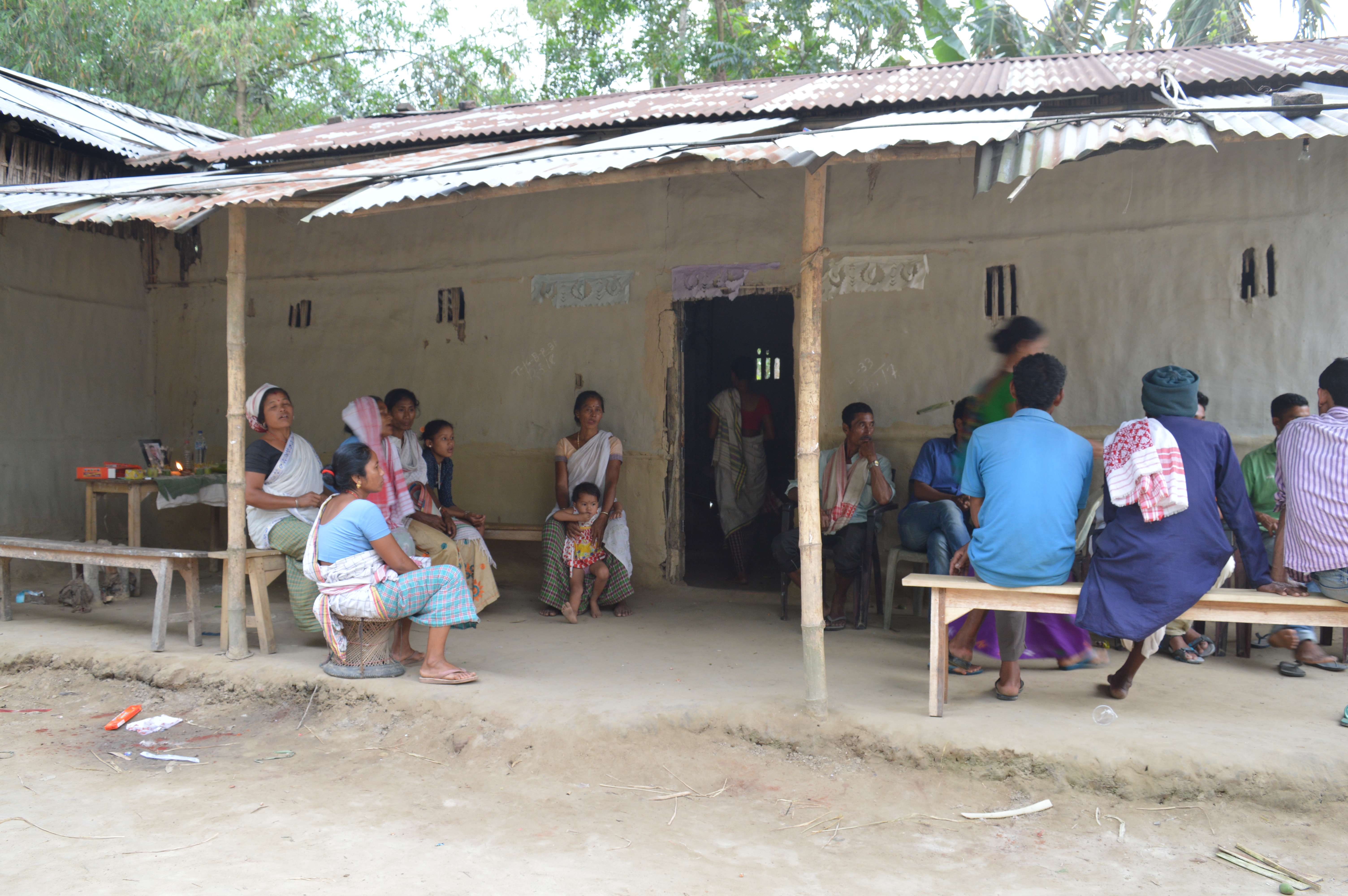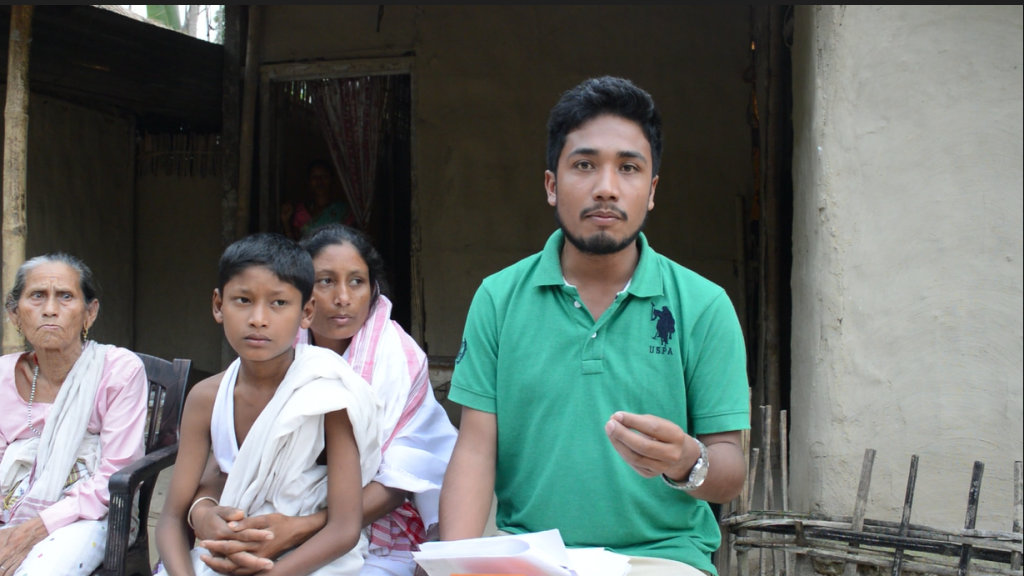Foot soldiers of conservation, but no one to care for them: How lack of timely treatment led to the death of a Kaziranga home guard

By Amit Kumar, TwoCircles.net
For the past 18 years, Jaikanta Pegu had been working as a forest home guard in the Kaziranga National Park. On April 16, while he was on patrol in the National Park, a commercial vehicle hit him and he was left with severe head injuries. Six days later, he was pronounced dead in Guwahati Medical College. But what happened in these six days has left his family feeling betrayed, angry and cheated. And a month after the incident, the indifference of the state administration and the forest department has only reminded the family that Pegu was seen as nothing but a low-class employee.
We first met Deepika Pegu, the wife of the deceased, three days after death had rocked the family. The family lives in a mud-house in Amtenga, a locality of Bokakhat, a sub-division of Golaghat district of Assam. Jaikanta’s photo sits on a wooden table on the porch of the house, surrounded by incense sticks, flowers and earthen oil lamps. Outside, friends and families discuss what happened, and what went wrong. It does not take long to see that grievances originate from the time of the incident itself. Pravin Pegu, Jaikanta’s nephew, in a conversation with TwoCircles.net, says, “My uncle had an accident at about 4.30 pm on April 16, but until the next afternoon, he had been barely provided proper medical care.” Pravin, who was with his uncle during the whole turmoil, says that that the higher ranking officials of the forest department showed they couldn’t care less about the accident. “First, he was taken to Jakhalabanda (about 65 km away from Bokakhat) for primary treatment but his condition was critical and the facilities in that town were not up to the mark so he was then taken to Tezpur, a further 36 km away,” he says.
According to Pravin, the forest department’s employee association handed him about Rs 20,000 for medical treatment which was neither sufficient nor the right step. “Instead of sending one fellow employee and some cash, the forest department should have called Tezpur Medical College to ensure that my uncle gets adequate treatment,” adds Pravin. Instead, he was again taken a further 200 km away to Guwahati and it was not until early morning next day that Jaikanta started receiving treatment.
But even then, the worst was still in store for the Pegu family. After Jaikanta was taken to Guwahati Medical College (GMC), he was supposed to be taken to the Intensive Care Unit (ICU) for immediate treatment. Instead, he was kept in the general ward for half of the day. It was not until the next day afternoon that he was taken to the ICU. “We were told that the ICU was full and hence he couldn’t be treated there. How can someone be treated in general ward for a severe head wound that needed immediate attention?” asked Pravin.
Throughout the conversation, Deepali Pegu sits quiet, unable to muster a word. Another relative, who is listening to Pravin, says angrily, “Is this how the government treats an employee? If there was no space in GMC, why wasn’t he shifted to a private hospital? All it would have taken is a call from the Forest Department to do so. Is this because he was just a home guard who worked on a contractual basis?” On April 22, around 2.30 am, Jaikanta Pegu was declared dead at the age of 38 after battling for six days.
Indifferent before death, irresponsible after it
A day after Jaikanta's death, the usual politics around the issue started and fearing that the locals would rise in protest, the then Minister for Forests, Pramila Rani Brahma visited the family. With a team of local politicians and flanked by local media, Brahma consoled the family and handed over a letter promising an ex-gratia amount.
[caption id="attachment_423325" align="aligncenter" width="640"] The family alleged that Pegu could have been saved had he been given proper and timely medical treatment[/caption]
The family alleged that Pegu could have been saved had he been given proper and timely medical treatment[/caption]
However, this letter was actually issued by World Wildlife Fund (WWF), which in turn promised an ex-gratia amount of Rs 3 lakh as part of its collaboration with ICICI Prudential Life Insurance. Mind you, this letter was just that; there was no cheque attached. Meanwhile, the family is also supposed to get an ex-gratia amount of Rs 4 lakh from the government, but a month after the incident, there is no news about how the family is supposed to get it. When a Forest official was asked about how the family could get the amount, he said the family must submit the post-mortem report, the death certificate and an identity proof to claim the amount. When asked how long the process would take, the official gave an extremely ambiguous answer. “It will take some time...I cannot confirm exactly how much since it is not in my hand...but it will be done soon. I think.” These were the same words used by the WWF official who signed the letter.
Interestingly, after the initial visit to the family, neither someone from WWF nor the state government/forest department has visited the family. When we spoke to Pranab Jyoti Bora, the senior coordinator for WWF for the Kaziranga-Karbi Anglong Landscape and the signatory of the aforementioned letter, he said he had spoken to the Divisional Forest Officers (DFO) about the same. But when asked if he had visited the family or spoken to them to help them get the ex-gratia amount, he answered in the negative. Once again, the family of Pegu believes that the actions of both the WWF and the Forest Department are irresponsible. “What use is this letter if we do not get the money? And how are we supposed to run to the WWF office located about 20 km from here to get the money?” asked Pravin.
“Death exposes the harsh reality of conservation”
Soon after Jaikanta’s death, political activists and social groups belonging to the Mising tribal community called for a protest against the behaviour of the forest department. Pranab Doley, an advisor to farmers organisation called Jeepal and a forest rights activist, said Pegu’s death once again showed that in the hierarchy of conservation, the foot soldiers are the least cared for. “Jaikanta Pegu worked for 18 years but was never made permanent so he had no medical cover, no provident fund and no social security of any sort. At the time of his death, he was earning Rs 8,200 per month which translates to about Rs 270 per day. How can someone be paid so little for so long? And now that he is dead, the ministers and forest officials are more interested in photo ops than actually helping the family. We are demanding an ex-gratia amount of Rs 20 lakh, a permanent job for a family member along with action against the concerned forest department officials for their lackadaisical attitude.” When we spoke to the officials of the forest department, they confirmed that there are no ‘permanent’ home guards employed by the Forest Department and that all are in fact, contract labourers. The ‘senior’ home guards like Pegu are paid Rs 280 per day while the junior ones are paid Rs 250 per day. Given that Pegu was from the Mising tribe, the death has also brought back old grievances of the community which lost the most amount of land to Kaziranga National Park. “We lost the most amount of land, and in return, we were told to be happy because we were given home guard and other menial jobs. The way they handled his treatment reminds us once again that the Kaziranga National Park might be built from the sacrifices of our community, but it is definitely not meant to help our community,” added Doley.
